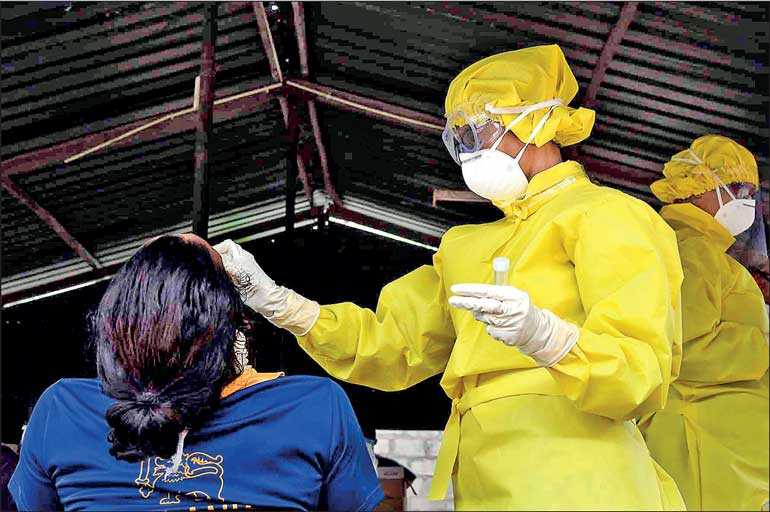Monday Feb 16, 2026
Monday Feb 16, 2026
Wednesday, 18 November 2020 00:00 - - {{hitsCtrl.values.hits}}

It is obvious that women make up a large percentage of first responders and frontline workers in this crisis as nurses and caregivers. They take the risks as healthcare workers and as primary caregivers at home. They are also scientists who are pathbreakers in COVID-19 research providing valuable insights into the nature of the COVID-19 virus through their labs, like Sri Lanka’s own Prof. Neelika Malavige. And yet, how many of them are involved in making the big decisions? – Pic by Shehan Gunasekara
We are in the tightening grip of the COVID-19 crisis. As much as we would like to wish it away, and for a while thought it had been militarily defeated, it’s proven far more recalcitrant than first imagined. 
While we await a medical solution such as an effective vaccine, some tweaking of the current model of COVID-19 control seems necessary to stop this sudden rapid spread which has every one petrified, apparently as much about the quarantine facilities as of the disease itself.
Scholars, scientists, policy makers and institutions around the world are studying the global responses to this crisis to learn the lessons. What they are discovering is fascinating. UN Women, the United Nations entity for gender equality, reported recently something that could come as a surprise to many:
“The majority of the countries that have been more successful in stemming the tide of the COVID-19 pandemic and responding to its health and broader socio-economic impacts, are headed by women. For instance, Heads of Government in Denmark, Ethiopia, Finland, Germany, Iceland, New Zealand and Slovakia have been widely recognised for the rapidity, decisiveness and effectiveness of their national response to COVID-19, as well as the compassionate communication of fact-based public health information.”
It appears that this could come as a surprise to nearly half the world’s population. The UN policy brief named ‘COVID-19 and Women’s Leadership’ reveals that “nearly half of the world’s population (47%) believed that men made better political leaders than women. Today, lower COVID-19 death rates and effective virus containment policies in countries led by women are disproving the discriminatory social norms driving these beliefs.”
The report highlights the possible clues to their success: “The leadership styles of women leaders in the COVID-19 response have been described as more collective than individual, more collaborative than competitive and more coaching than commanding.”
One or two lessons here that we might wish to learn.
It is obvious that women make up a large percentage of first responders and frontline workers in this crisis as nurses and caregivers. They take the risks as healthcare workers and as primary caregivers at home. They are also scientists who are pathbreakers in COVID-19 research providing valuable insights into the nature of the COVID-19 virus through their labs, like Sri Lanka’s own Prof. Neelika Malavige. And yet, how many of them are involved in making the big decisions?
UN Women has declared that the theme of International Women’s Day 2021 is ‘Women in Leadership: Achieving an Equal Future in a COVID-19 World’. It is being “aligned with the priority theme of the 65th session of the Commission on the Status of Women, “Women's full and effective participation and decision-making in public life, as well as the elimination of violence, for achieving gender equality and the empowerment of all women and girls.”
Sri Lanka made a start in promoting women’s political participation with a 25% quota being allocated for women in local government bodies, while Cabinet approval is being sought to provide 30% nominations for females at the Provincial Council elections, according to the UN Women First Progress Report on Sri Lanka after the Global Leaders meeting (2015).
The shameful issue of violence against women has so intensified during the COVID-19 pandemic that the United Nations calls it the Shadow Pandemic and has launched an awareness campaign which includes a sixty-second film narrated by Academy Award-winning actor Kate Winslet. The UN Secretary General’s report ‘Shared Responsibility, Global Solidarity: Responding to the socio-economic impacts of COVID-19’ warns that there “has been a spike in domestic violence reporting, at exactly the time that services, including rule of law, health and shelters, are being diverted to address the pandemic”.
The recently released ‘2019 Women’s Wellbeing Survey’, the first national survey on violence against women and girls in Sri Lanka, found that nearly a quarter (24.9%) of women have experienced physical and/or sexual intimate partner violence or non-partner sexual violence. This is an unacceptable percentage of criminal conduct. Women living in the estate sector reported a much higher percentage.
The report reminds that “Violence against women is one of the most pervasive human rights violations that impacts the progression and wellbeing of women and girls.” It articulates the open secret that “violence against women is often perpetrated by those closest to them. Women in Sri Lanka are more than twice as likely to have experienced physical violence by a partner in her lifetime (17.4%) rather than by anybody else (7.2%).” This already serious situation deteriorated exponentially during the COVID-19 outbreak.
In announcing the International Women’s Day 2021 theme, the UN recommends that in order “to uphold women’s rights and fully leverage the potential of women’s leadership in pandemic preparedness and response, the perspectives of women and girls in all of their diversity must be integrated in the formulation and implementation of policies and programmes in all spheres and at all stages of pandemic response and recovery.”
This critical component of a state’s responsibility to its citizens, most of whom are women, and most of whom are disproportionately affected by the current crisis, we can only hope, is being addressed through the active intervention of the Government’s designated entity for Women’s Affairs now downgraded to a State Ministry.
The 2019 Women’s Wellbeing Survey gives seven recommendations to address the pressing issues that were revealed in their investigations:
1. Use these results to inform development of the next phase of the National Policy Framework and Action Plan to address Sexual and Gender-based Violence so that it will be evidence-based and directs resources towards priority areas.
2. Disseminate the findings of this survey widely among development practitioners working on achieving sustainable development goals and gender equality in Sri Lanka.
3. Empower young women and girls to recognise their rights to a life free of violence and to locate and access appropriate services.
4. Recognising that living in a violent household as a child is one of the main risk factors, seek opportunities, such as through education and behaviour change campaigns to end learned violent behaviour within the family.
5. Given that men’s harmful expressions of masculinity (alcohol abuse, fighting with other men, extramarital affairs) are closely associated with risk of partner violence for women, it is critical to seek opportunities to educate and partner with men and boys to advance gender equality and to end violence against women.
6. Conduct qualitative research to explore the causes, consequences, and patterns of violence against women and to triangulate the findings from the quantitative survey.
7. Support the Department of Census and Statistics to facilitate further analysis of the data from this survey by verified researchers in a safe and ethical way that ensures the confidentiality of respondents is protected.
It has never been more clear that without more women as legislators at the highest level, the State’s responsiveness to these important national issues which ultimately affect the whole of society, its economy, its wellbeing and progress, will not take the quantum leap that it should, in the intense jostling for limited State resources by the unconscionable percentage of male legislators adorning the legislature of a country with a 52% female population. The cause of the shadow pandemic is a persistent virus, stubbornly resistant even to national and self-interest. We need a vaccine by 2024.